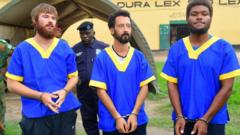The trio was originally sentenced to death by a military court before the decision was changed last week, paving the way for their transfer to serve their sentences in the U.S. This move coincides with growing talks between the U.S. and DRC, focusing on the country's vast mineral resources, including coltan and cobalt — key materials for electronics and electric vehicles, predominantly mined by Chinese firms.
According to Congolese presidential spokesperson Tina Salama, the Americans' return to the U.S. was conducted in "strict compliance with legal procedures", emphasizing a commitment to judicial diplomacy and cooperation between the two nations. The three men were among a group of 37 individuals sentenced after an attempt to attack state officials, including the presidential palace, resulting in multiple casualties, including suspected coup leader Christian Malanga, a U.S. citizen of Congolese descent.
While the U.S. government has expressed support for DRC's legal processes, experts suggest that shortening their sentences remains improbable. Legal representatives surmised the U.S. would continue to adhere to justice while respecting human rights. Recently, the Congolese government has also taken responsibility for damage incurred during protests against the U.S. embassy, a matter that has yet to be officially addressed by U.S. officials.
As diplomatic relations fluctuate, the repatriation of the Americans highlights the intersection of international law, human rights, and economic interests within the context of DRC's rich mineral landscape.
According to Congolese presidential spokesperson Tina Salama, the Americans' return to the U.S. was conducted in "strict compliance with legal procedures", emphasizing a commitment to judicial diplomacy and cooperation between the two nations. The three men were among a group of 37 individuals sentenced after an attempt to attack state officials, including the presidential palace, resulting in multiple casualties, including suspected coup leader Christian Malanga, a U.S. citizen of Congolese descent.
While the U.S. government has expressed support for DRC's legal processes, experts suggest that shortening their sentences remains improbable. Legal representatives surmised the U.S. would continue to adhere to justice while respecting human rights. Recently, the Congolese government has also taken responsibility for damage incurred during protests against the U.S. embassy, a matter that has yet to be officially addressed by U.S. officials.
As diplomatic relations fluctuate, the repatriation of the Americans highlights the intersection of international law, human rights, and economic interests within the context of DRC's rich mineral landscape.



















